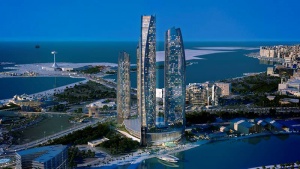WTTC 2013: Changing demographics buffet tourism industry
 Jumeirah at Etihad Towers is hosting the 2013 event
Jumeirah at Etihad Towers is hosting the 2013 event The ageing population, an increasingly connected society and fluctuating economic conditions are just three of the major factors that will set future trends in the global travel and tourism industry, according to industry leaders who spoke on the first day of the World Travel & Tourism Council Global Summit.
Other factors include the growth of the middle class with its increased disposable income; as well as the emergence of a new generation that prioritises travel and cares for its environment.
“We live in new Renaissance, we live in a period of unparalleled opportunity, which has changed in different ways we can’t begin to imagine,” professor Ian Goldin, director, Oxford Martin School, University of Oxford, said during his address to the Summit.
“The trends of the future will be demographic, economic and ecological, globalisation is the most progressive, powerful force we’ve ever seen, but it needs to be managed,” he concluded.
Professor Goldin spoke during the first session of the Summit entitled ‘The Global Context’ at the two-day event held in Jumeirah by Etihad Towers.
The opening keynote address was made by WTTC president David Scowsill, who said: “Travel is a way of life and even in the toughest times, it continues to be a priority for populations around the world.
“Travel and tourism drives economies and creates jobs; and even in challenging economic times, it still has the potential to grow, as consumer appetite for travel beyond national borders remains insatiable.”
According to Dr Stelter, senior partner and managing director, The Boston Consulting Group there will be some ‘mega-trends’ shaping the industry.
“The Travel and tourism mega-trends that will impact the industry are changing customer needs because of an ageing population; the shift to RDE; further globalisation; and more convenience and time compression,” he said to a packed auditorium.
There will be hurdles thrown up by mobility, infrastructure challenges and energy scarcity; new technology and increased intermediation, he explained.

